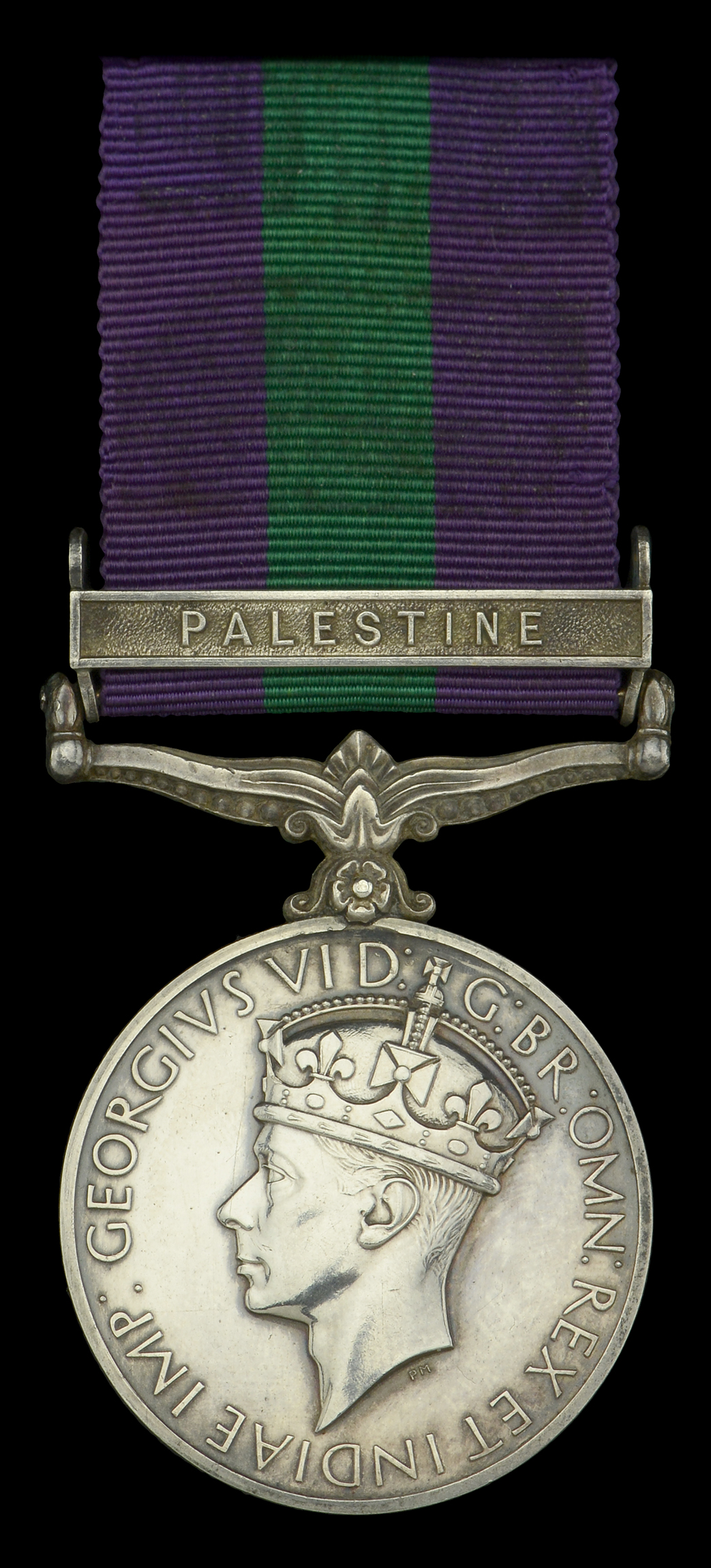The G.S.M. with clasp Palestine awarded to Flight Sergeant J. A. Gore, Royal Air Force, who survived the near eradication of 211 Squadron in Greece and the Far East, only to be killed returning to the UK, when the S.S. Abosso was torpedoed off the Azores by the German submarine U-575, 8 October 1942 General Service 1918-62, 1 clasp, Palestine (563780 L.A.C. J. A. Gore. R.A.F.) good very fine £200-£300 --- John Arthur Gore was born in January 1913 and was the son of Mr and Mrs J. H. Gore of St. Pancras, London. He resided in Uttoxeter, Staffordshire when he enlisted as an Apprentice at R.A.F. Halton in 1929, and was subsequently posted to 1 and 211 Squadrons. Gore’s trade was as a Metal Rigger, and he moved with the latter squadron to Helwan, Egypt in May 1938. He served with 211 Squadron in Ramleh, Palestine from July 1938. The Squadron moved to El Dabra in the Western Desert with the outbreak of the Second World War. Italy invaded Greece in October 1940, and 211 Squadron (Blenheims) was one of several R.A.F. Squadrons sent to reinforce the Greeks. The Squadron’s groundcrew, including Gore, were shipped in H.M.S. Gloucester. The Germans invaded Yugoslavia in Spring 1941, and soon moved into northern Greece. The R.A.F. Blenheims proved no match for the German fighter aircraft, and Gore’s squadron fought to a state of virtual extinction - suffering the loss of 6 aircraft in 7 minutes, 12 April 1941. The remainder of the Squadron were evacuated, and Gore who had advanced to Sergeant stayed with the Squadron as it was re-equipped and reformed with members of No. 72 O.T.U. The Squadron was posted for operational flying in Malaya, and the groundcrew departed Helwan on H.M.T. Yoma bound for the Far East, 16 January 1942. The Squadron’s Blenheims and crews embarked on the long flight in the following days. Whilst en route Singapore had become untenable, and 211 Squadron were ordered to proceed to Sumatra. They began arriving at the airfields around Palembang, P1 and P2 from 23 January. However, the groundcrew did not arrive until 14 February by which time the aircrew had already been in action and suffered casualties. Japanese paratroopers landed at Palembang, 15 February 1942. The few remaining squadron aircraft were flown to Kalidjati, Java, and the groundcrew followed by any route available on the 17th. Gore is believed to have been one of the party of 25 airmen left behind to destroy equipment at P2 in order to stop it falling into enemy hands. Two days later the Squadron handed over its’ two remaining Blenheims to 84 Squadron, and then ceased to exist. From then on it was every man for himself, with the vast majority either being taken prisoner or killed by the Japanese. Gore had advanced to Flight Sergeant, and was evacuated from Tjilajap, Java by the R.A.F. Auxiliary tender Tung Song, 2 March 1942. He was amongst the last R.A.F. personnel to be evacuated, and the Tung Song arrived at Freemantle, Australia, 13 March 1942. Gore was sent back to the UK, and was aboard the S.S. Abosso en route from Cape Town to Liverpool when she was torpedoed and sunk by the German submarine U-575 (Guenther Heydemann), 8 October 1942. She went down 700 miles North West of the Azores, with losses of 148 crew, 18 gunners, and 173 passengers. Gore was amongst those to be killed, along with at least 18 other R.A.F. personnel who had all escaped the Far East via Ceylon and Australia. Unusually the above mentioned airmen, including Gore, are all commemorated on the Singapore Memorial. Sold with copied research.
Auctioneer's Buyers Premium: 24% (+VAT)
There is an additional charge of 4.95% (+VAT/sales tax)
See Full Terms And Conditions





